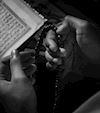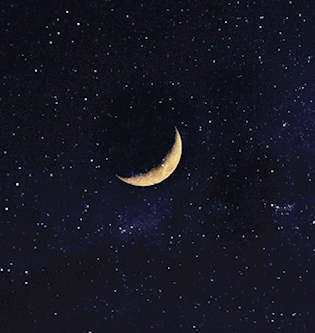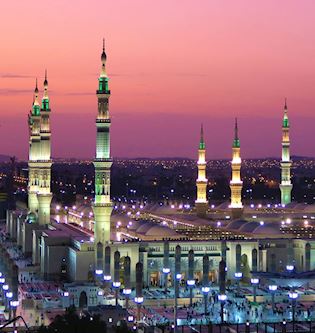The History of Mawlid Poems: From the Sahabah Until Today

This Rabi al-Awwal, many of us will have heard the term ‘Mawlid’ or perhaps the phrase ‘Mawlid gatherings’. But what is the meaning behind this word and what is the history of these gatherings? We’ve put together an article to answer any questions you might have!
What does the word ‘Mawlid’ refer to?
Mawlid, also referred to as milad or mawlud, linguistically means the time or place of birth. This can refer to the birth of anyone, whether man, woman or animal. However, in the Islamic tradition, Mawlid refers to the birth of the Prophet Muhammad (saw). This is usually commemorated on 12th Rabi al-Awwal, this date being the opinion of the majority of scholars, as well as the historian Ibn Ishaq (rh).
Mawlid also refers to a genre of poetry that centres on the period and events surrounding the Prophet’s (saw) birth. This poetry falls under the literary category of the Seerah - which is concerned with the events of the Prophet’s (saw) blessed life. Throughout history, many scholars and poets wrote extensively about the Prophet’s (saw) birth, using the poetic form to allow ease of memorisation and participation in gatherings where Mawlid poems are recited.
What is a Mawlid gathering?
Whether far West in Morocco or East in Indonesia, Mawlid gatherings are united around a similar form - reading the Qur’an, reciting a Mawlid poem, reciting songs of praise upon the Prophet (saw) (Qasaaid), and sharing food.
In many places, these gatherings are held not just on 12th Rabi al-Awwal, but on a weekly basis, especially on Thursday nights after Maghrib. This is because we are encouraged to increase our salutations upon the Prophet (saw) on Friday:
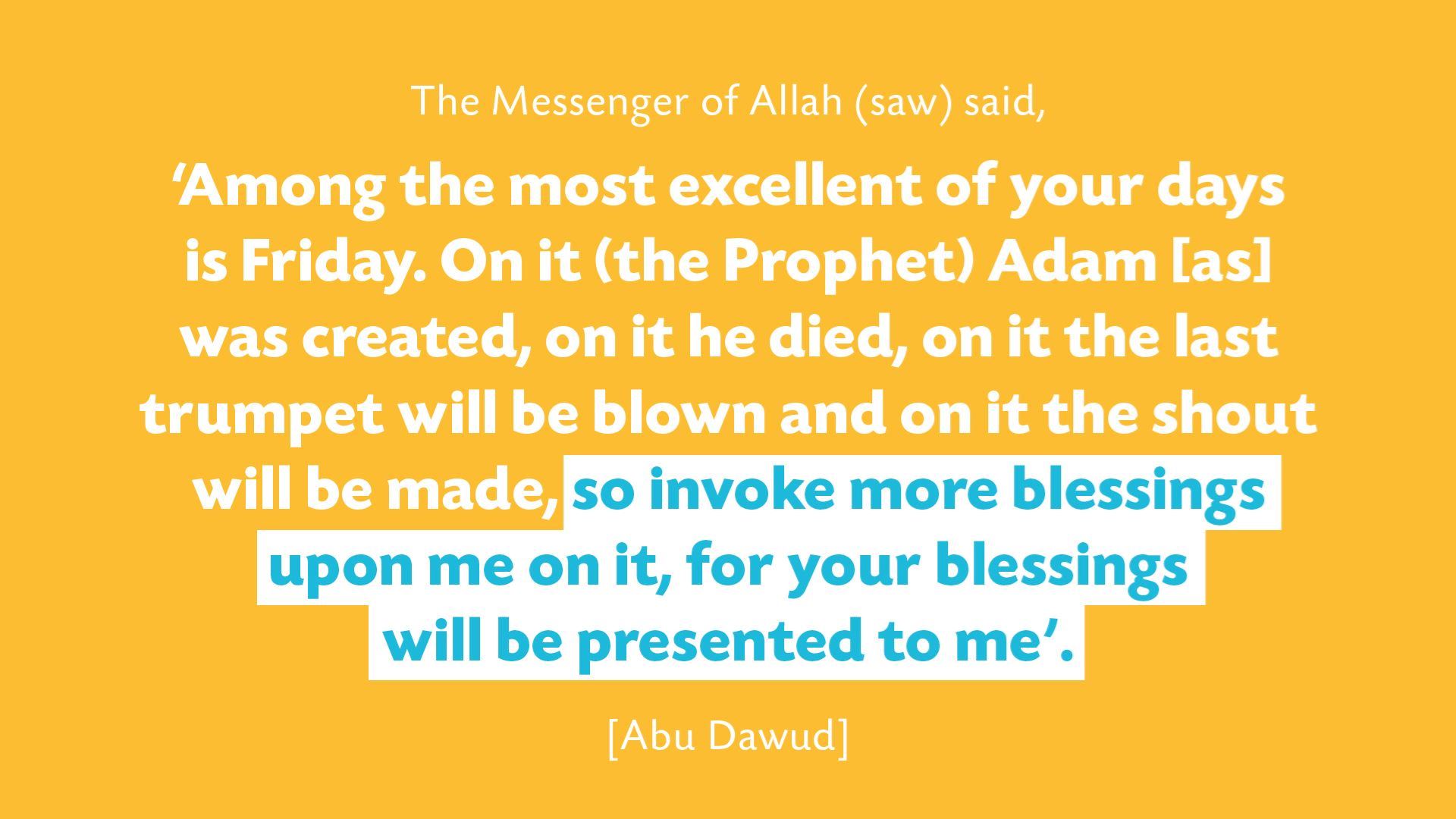
In Tarim, Yemen, Mawlid gatherings are held on a daily basis across the vast number of masjids and private homes. The Mawlid is recited at a time of good news, as well as at the commemoration of someone long passed away.
When did Mawlid poetry begin?
In pre-Islamic times, poetry was the preeminent art form across Arabia. Each tribe held their greatest poet up high, with reputations won and lost in direct verbal combat. The words of a poet could instigate or cease a tribal war. Poets would compose words to laud or to satirize, to praise or defame. This was often done on the spot, with no preparation, with the onlookers deciding the winner. Such was the high regard for poetry that seven poems, known as the Mu‘allaqat (‘the suspended ones’ on walls of the Ka‘bah) came to be distinctly revered for their eloquence and majesty.
It is in this environment of respect for the spoken word that the Qur’an, and Islam as a whole, was revealed.
’With the coming of Islam, the Qur’an addressed poetry directly: poets were generally hypocrites in that their high words were not reflected in their deeds and poets had a certain moral decay which included often being braggarts and liars. However, the door was left open for the possibility of pious poetry’. [Songs of Presence]
Indeed, the Prophet (saw) said, ‘Truly, in some poetry, there is wisdom’. [Bukhari]
One such companion who embodied the meaning of a pious poet was Hassan bin Thabit (ra). He was known as the poet of the Prophet (saw) and would be instructed to answer the Prophet’s critics in return. The Prophet (saw) would even have a special pulpit in his Masjid placed for him to do this:
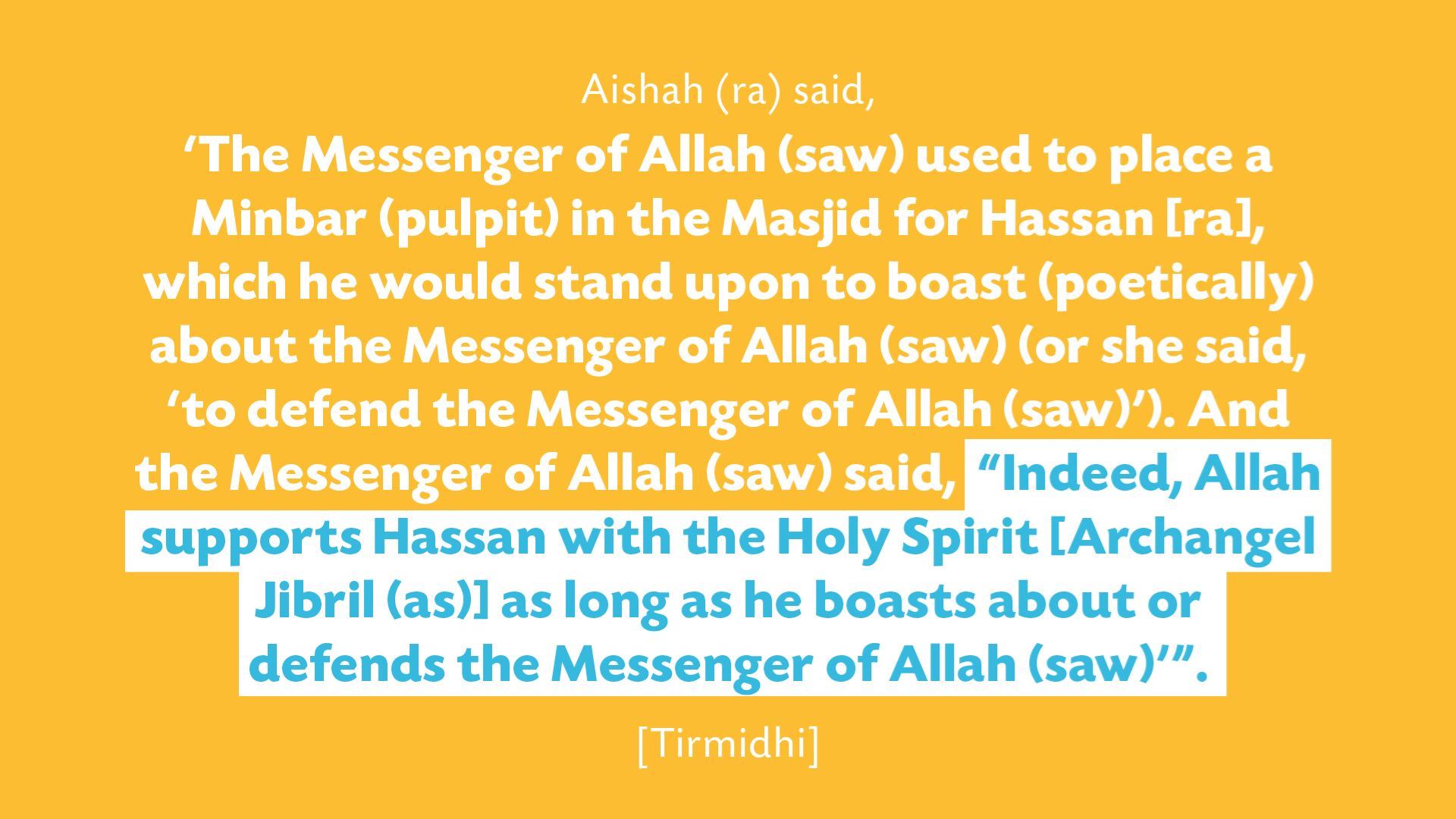
Hassan’s (ra) most well known poem, which directly mentions the birth of the Prophet (saw), reads:
وَأَحْسَنُ مِنْكَ لَمْ تَرَ قَطُّ عَيْنِي
وَأَجْمَلُ مِنْكَ لَمْ تَلِدِ النِّسَاءُ
خُلِقْتَ مُبَرَّأً مِنْ كُلِّ عَيْبٍ
كَأَنَّكَ قَدْ خُلِقْتَ كَمَا تَشَاءُ
’My eyes have not seen a more handsome person than you,
No women has given birth to a more beautiful person than you,
You have been created without any weakness and blemish,
As if you have been created as you wished to be created’.
As the Prophet (saw) said, ‘Truly, in some poetry, there is wisdom’. [Bukhari]
Many Sahabah (ra) were adept at composing and reciting poetry, especially the following four: Ka’b ibn Zuhair, Abdullah ibn Rawaha, Ka’b ibn Malik, and the previously mentioned Hassan ibn Thabit (ra). Abu Bakr (ra) was also known to recite poetry, and his daughter Aishah (ra) was famous for memorising thousands of verses. The Prophet’s (saw) uncle and supporter al-Abbas (ra), having returned from their last journey together, addressed the Prophet (saw) with these poetic verses:
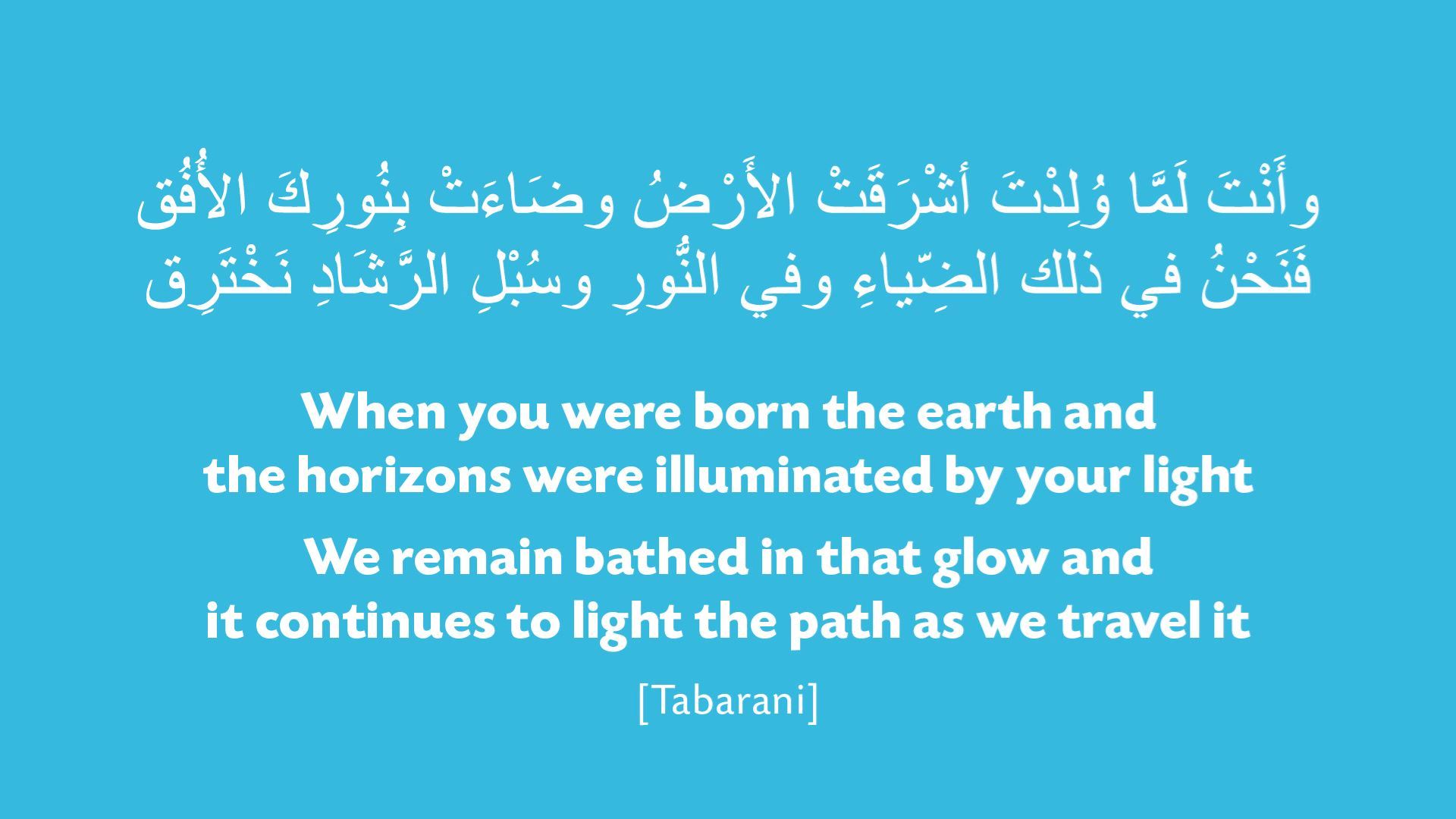
How is Mawlid mentioned in the Qur’an and Sunnah?
What many may find surprising is that the Qur’an itself mentions the birth of the Prophets ’Isa (as) and Yahya (as), as well as alluding to the birth of the Prophet Muhammad (saw) himself.
After giving his parents glad tidings of the coming birth of Prophet Yahya (as), the Qur’an says, ’And peace be upon him the day he was born and the day he dies and the day he is raised alive. [Qur’an, 19:15]
The surah continues to describe the birth of the Prophet ’Isa (as) in great detail from verses 16 to 33, which ends with the Prophet ’Isa (as) speaking in the first person by saying, ‘And peace is on me the day I was born and the day I will die and the day I am raised alive’. [Qur’an, 19:33]
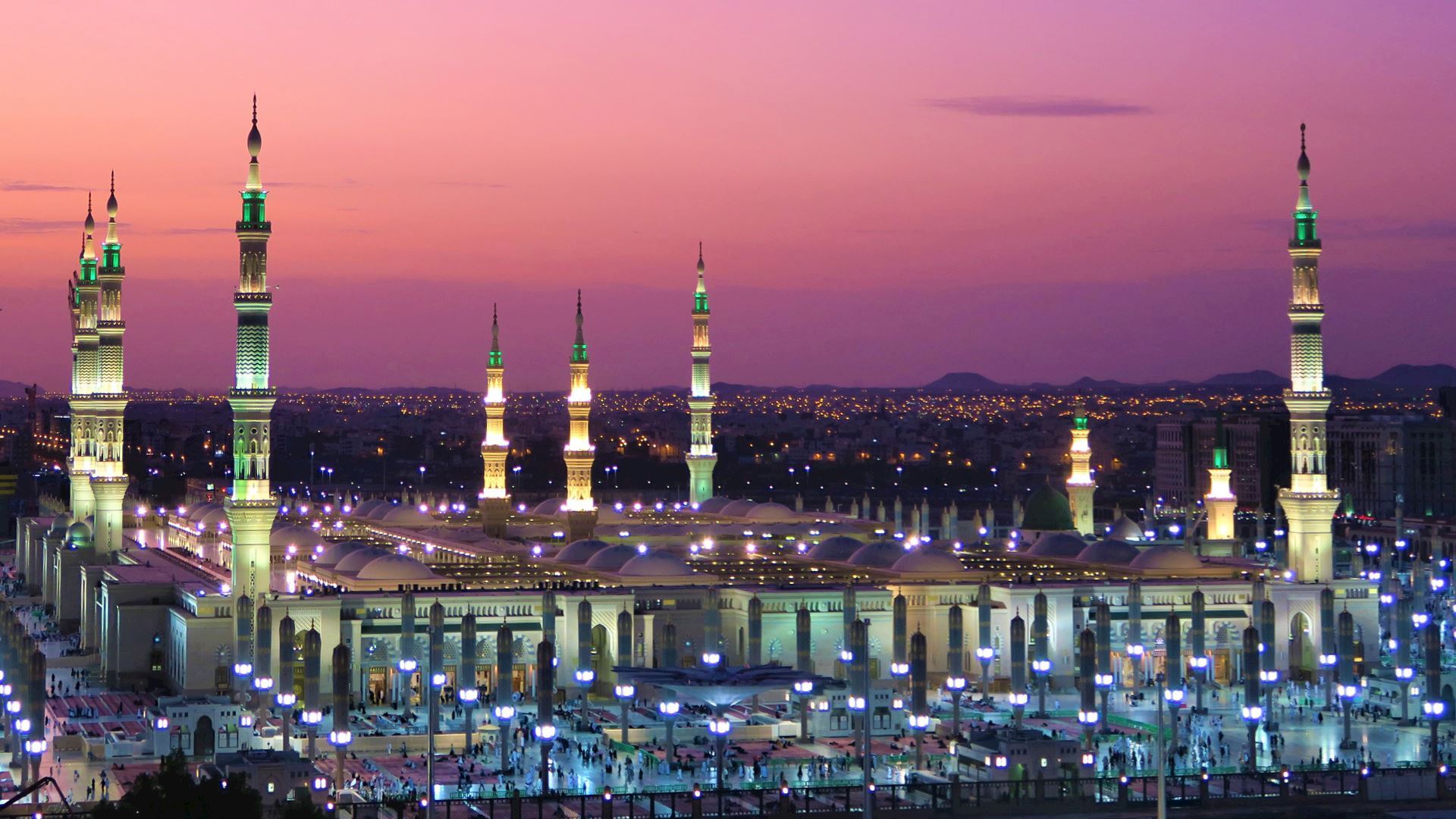
The Prophet (saw) was born in what came to be known as the Year of the Elephant (570 CE), the year in which the powerful army of Abraha was defeated. Surah al-Fil (Chapter 105) recollects the dramatic events, with the name of the year of the Prophet’s (saw) birth forever tied to the Qur’an.
There are many narrations which describe the miraculous events surrounding his (saw) blessed birth. However, perhaps the most well-known hadith about his birth was when the Messenger of Allah (saw) was asked why he fasted on Mondays, whereupon he said, ‘It is the day when I was born and on it revelation was sent down to me’. [Muslim]
What are some famous Mawlid poems?
Mawlid poems have been written, and continue to be written, in multiple languages for centuries. Just as the style and rhythms of Arabian poetry in general fits within eight poetic meters called Maqamaat, the contents of the most well known poems have come to take a particular form.
A Mawlid poem will usually contain chapters about:
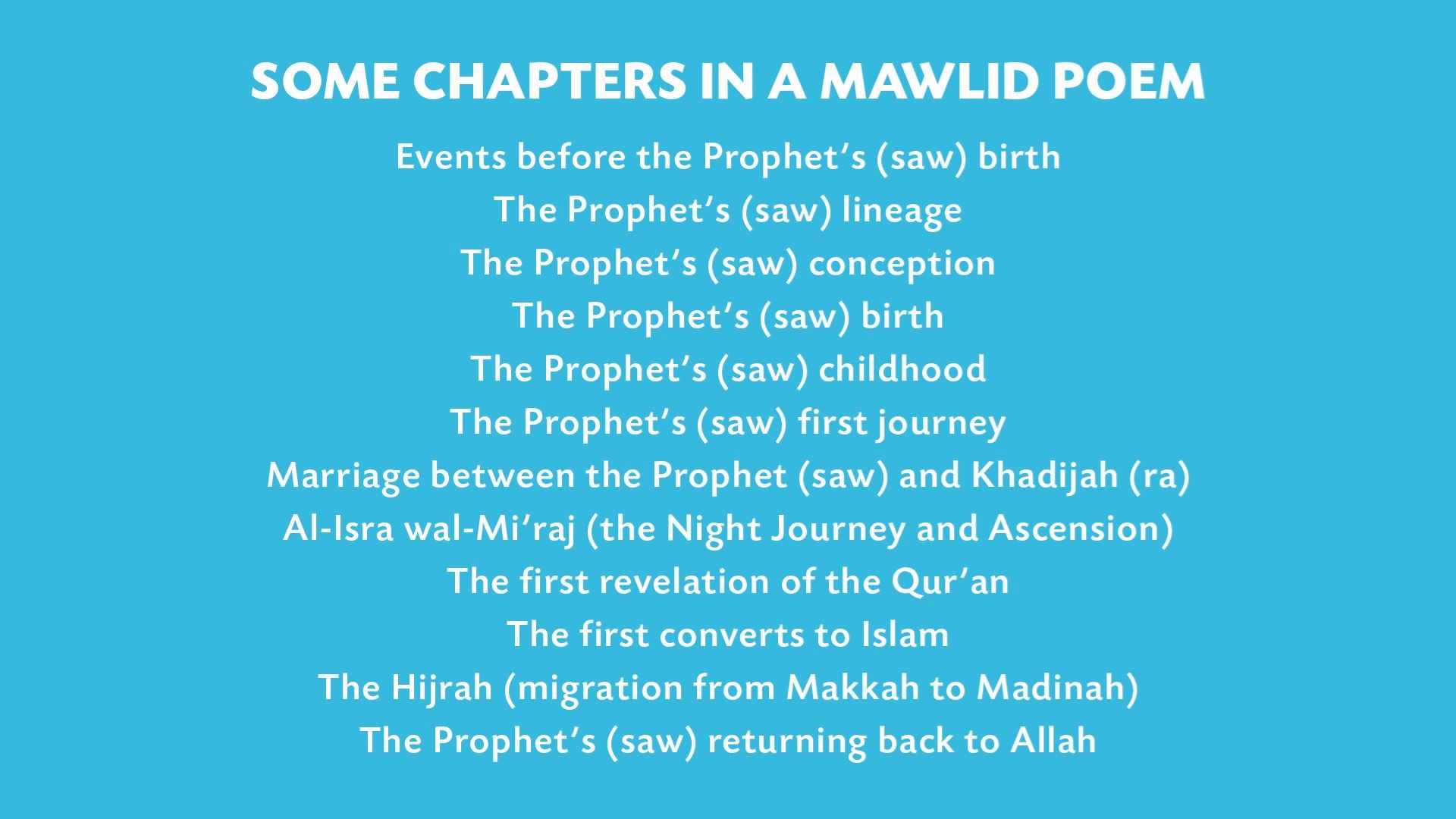
Perhaps the most well-known poem specifically about the Prophet’s (saw) birth and early life was by Imam al-Barzanji (rh) (d. 1766 CE), whose nineteen chapter eulogy contains 355 verses. It is sung across the whole of the Muslim world, and is particularly famous across large parts of Africa. Between each chapter is sung:
’O Allah, scent his noble grave with an aromatic fragrance of blessings and peace.
O Allah, bless him, grant him peace and blessings’.
Another famous poem, which some would argue is the most recited poem in the history of the world, devotes a chapter to the Prophet’s birth (saw). In Chapter 4 of Qasidah Burdah, written by the Egyptian Imam Busairi (rh) (d. 1294 CE), he writes in eloquent Arabic:
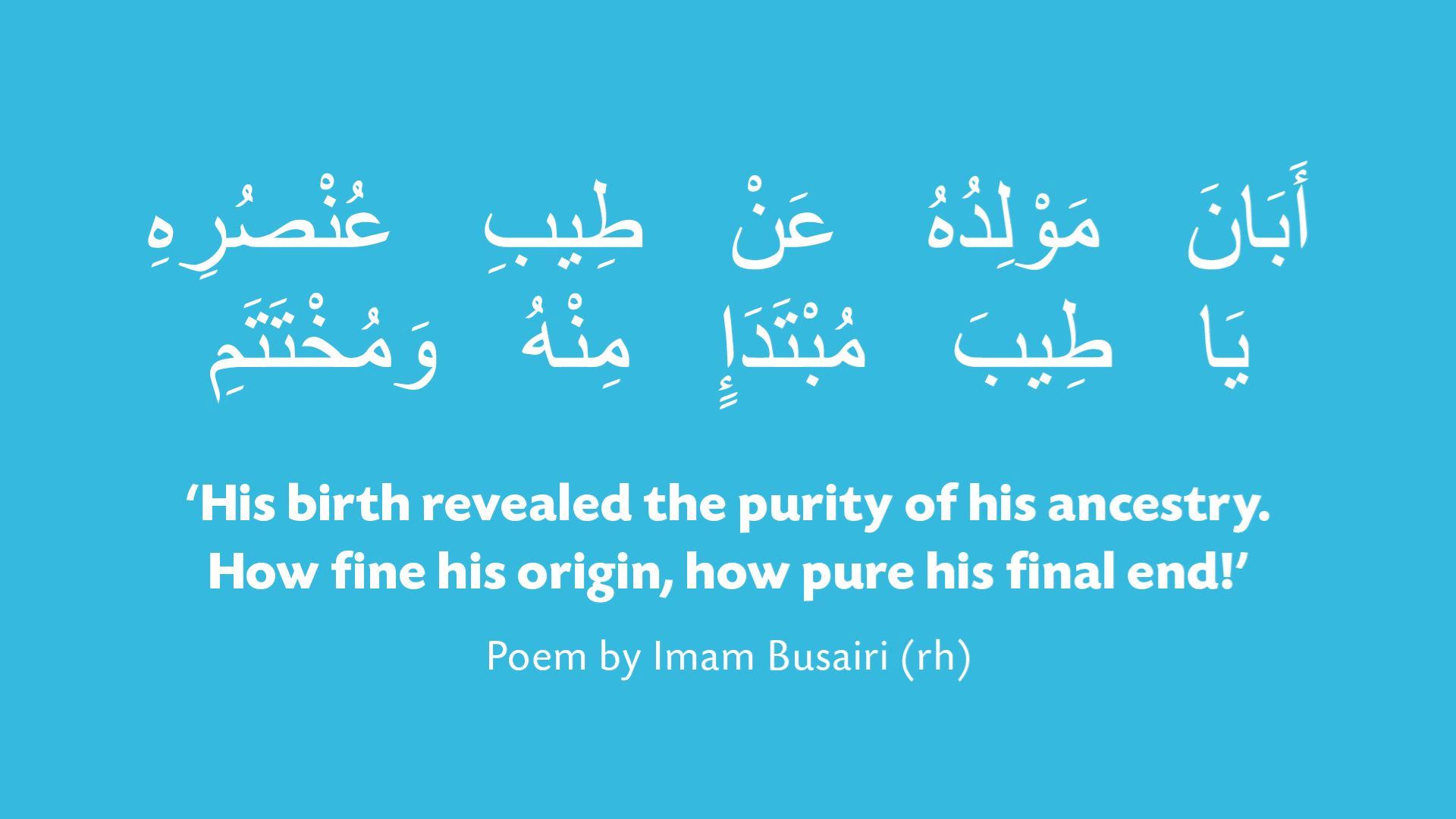
Moving to more contemporary times, Mawlid poems still continue to be written across the Muslim world. One which has gained fame and acceptance in recent years is ‘Diya’ al-Laami - The Resplendent Illumination’ by Habib Umar of Yemen, himself a direct descendent of the Prophet (saw).
Although Mawlid poems have appeared in many languages, such as Spanish and Turkish, none had been written exclusively in English. That all changed when 15 year old Noor Yusuf published a complete work in 2014, entitled ‘The Soliloquy of the Full Moon’, which is a 1,000 lined, fully rhymed epic that uses many classical British melodies to carry the reader through the early life of the Prophet (saw):
’She heard, ’within your womb you hold this people’s lord, so say
Upon his birth: ’I place him in the refuge of the One
Against the evil of the envier.’ And this, his name…’
What is his name? It surely is the loftiest of names!
Indeed he ever was a Mercy sent unto the world;
While yet unborn he was Concerned for her whom he so loved.
The Lover and Beloved did console her in her grief,
Preserving her from sorrow, granting solace, rest, relief’.
Intentions of the Mawlid
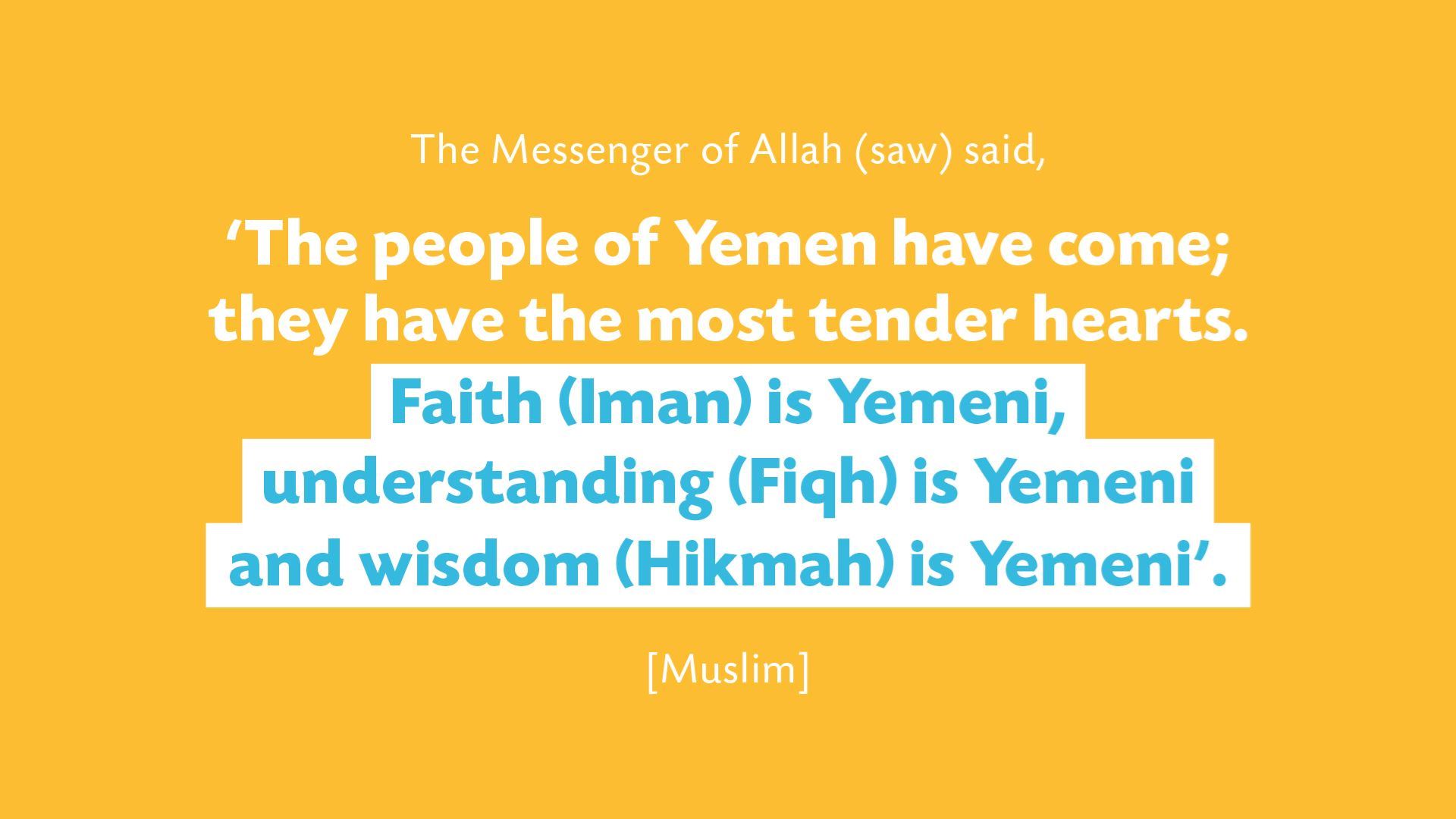
The wise scholars of Yemen place great emphasis on having clear intentions before beginning each act, and it is important for you to reflect on your specific intentions at a Mawlid gathering.
Here are just a few of the intentions used by the scholars of Yemen:
- Allah deflects calamities from us and from all of the people of la ilaha ill Allah in the East and the West.
- Allah fills our hearts with the light of faith and certainty and knowledge of Him. That He makes us among those He has chosen to bring close to Him and among those He has blessed with the realities of sincere and pure slavehood to Him.
- Allah allows us to be closest to the Prophet (saw) in the Barzakh, in the shade of the Throne, at the Pool, when he passes over the Bridge, and when he enters Paradise with the intention that He rectifies our hearts and our bodies, our inward and our outward and all our affairs, that He deflects all evil from us.
May Allah draw us closer to the Prophet (saw) and keep us upon the Qur’an and Sunnah, Ameen!
Don’t forget to share this article with friends and family! As the Prophet (saw) said, ‘Whoever guides someone to goodness will have a reward like one who did it’. [Muslim]






